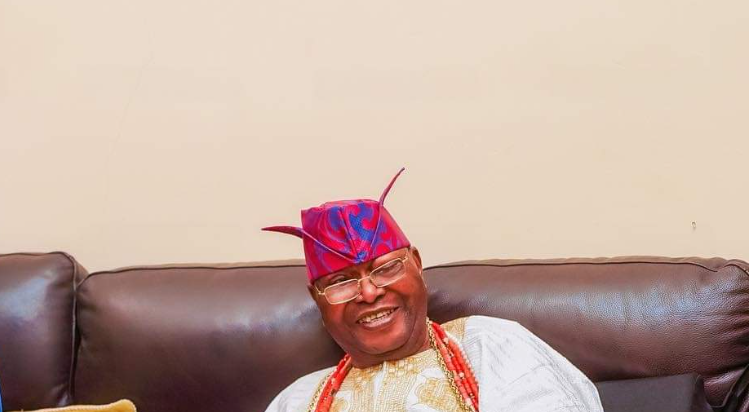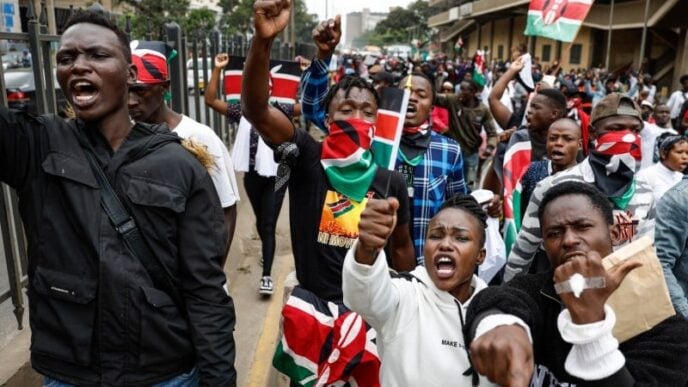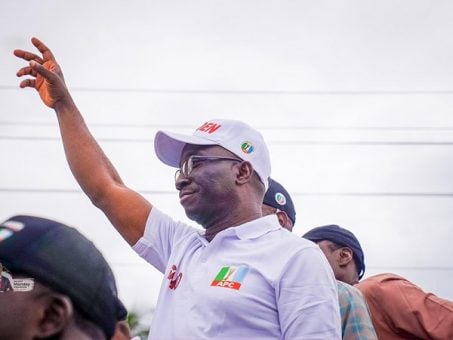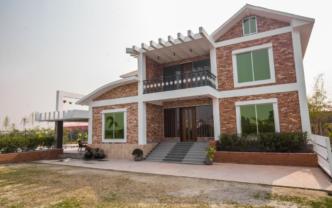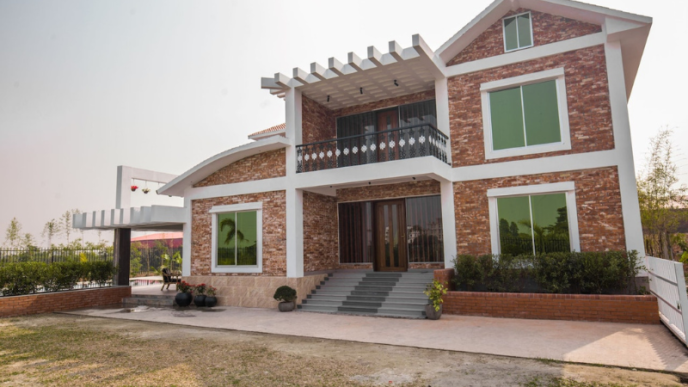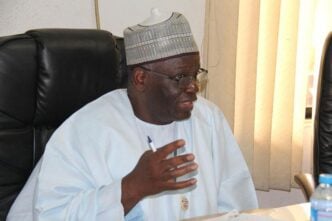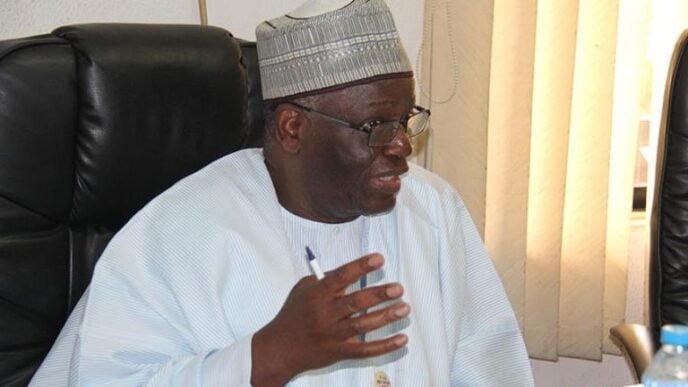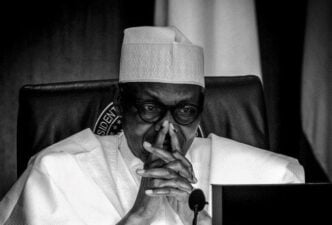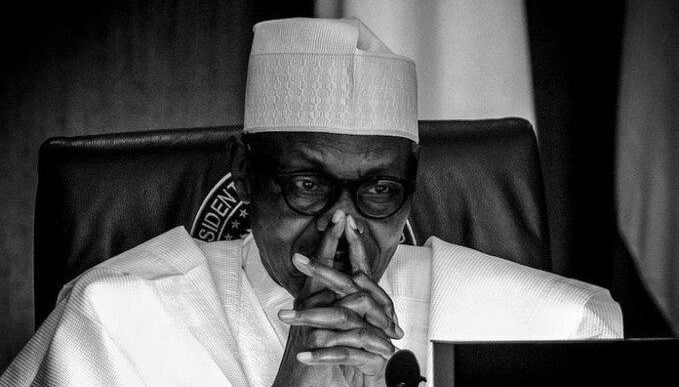BY OLATUNDE AKANDE
On Sunday, July 13, 2025, Nigeria, and indeed the world, bid farewell to a towering figure of tradition, principle and progressive leadership. His Royal Majesty, Alayeluwa Oba Sikiru Kayode Adetona, GCON, Ogbagba II, the Awujale and Paramount Ruler of Ijebuland, passed on at the distinguished age of 91, having spent over six remarkable decades on the throne.
His death marks the end of an era, but his legacy continues to echo far beyond the confines of Ijebu Ode.
My earliest memory of him comes from my grandmother’s living room in Challenge, Ibadan, where a large coloured portrait of the Awujale and his younger brother, Chief Supo Adetona, both adorned in resplendent traditional regalia, hung prominently on the wall. My late grandmother, Chief (Mrs.) Oyindamola Juliana Adenuga, the Iya Alaje of Ijebu-Igbo and the Yeye Oba of Ijebuland, often recounted the story of her nephew’s historic ascension to the throne in 1960 at just 26 years old, a young man of promise thrust into royal responsibility at the dawn of Nigeria’s independence.
Advertisement
She and the Awujale’s mother, fondly known as “Mama Ijebu Ode,” were sisters, born into the illustrious Onashile family of Okesopen, Ijebu Igbo. This family connection meant that the Awujale and my late mother, Chief (Mrs.) Margaret Afolasade Akande, were first cousins.
I still recall with deep fondness the beautiful memories of travelling with him and his children on my first trip to London. We stayed at his flat on Willesden Lane, a lively hub for family and friends that later shifted to Christchurch Avenue. In the evenings, he would take us out in his swanky Jaguar to some of the finest restaurants in London. He had an unmistakable flair for good living and relished the finest cuisine. There was a regal elegance in everything he did.
Even outside the palace, Kabiyesi always turned heads. Handsome, with boyish good looks that seemed to defy time, he carried himself with quiet confidence and charm. A majestic dresser with impeccable taste, his wardrobe fused Yoruba royalty with Savile Row sophistication. He walked with the effortless grace of a king, never hurried, always composed.
Advertisement
Educated at Olu-Iwa College (later Adeola Odutola College) and trained as an accountant in the United Kingdom, the Awujale was a monarch shaped by a rare blend of indigenous wisdom and global exposure. He returned to Nigeria at a time when the country was transitioning from colonial rule to independence, eager, restless and brimming with possibility. From the beginning of his reign, he embodied the spirit of a new Nigeria: confident in identity, but open to modern ideas.
His progressive worldview was evident throughout his reign. Long before transparency became a buzzword in public discourse, the Awujale was a vocal advocate for accountability in traditional leadership. His public stance against corruption and his fearless candour, especially during military regimes, set him apart as a royal who could not be silenced. He spoke truth to power without fear or favour. That courage earned him respect across political and ideological divides.
Growing up, my occasional visits to Ijebu Ode during the Ileya (Eid-el-Kabir) festival felt like pilgrimages. The Awujale’s court was a colourful tapestry of Yoruba culture at its finest. Under his stewardship, the Ojude Oba Festival was transformed into a globally recognised celebration of Ijebu identity. What was once a modest homage by different age groups is today a major cultural and tourism event, attracting thousands from across the world.
The palace, during these festivals, buzzed with dignitaries, well-wishers, and extended family. I particularly cherished those visits, especially after marrying into the prestigious Fowora family of Ijebu Ode. My late father-in-law, Engineer Adeoye Fowora, shared a personal relationship with the Awujale, which further deepened my appreciation for the Ijebu cultural heritage and Kabiyesi’s pivotal role in preserving it.
Advertisement
Yet, beneath the grandeur, he remained a deeply relational man. His lifelong bonds with my grandmother and mother were marked by warmth, loyalty and presence. Whenever they were in London, they would often stay close to him, ensuring that family ties remained unbroken, even across oceans and decades.
He was the glue that held so many strands of our extended family together, a monarch, yes, but also an uncle, a cousin and a friend.
As we mourn, we also celebrate a life that did not merely occupy a throne but transformed it. A life of honour, conviction and public service. A reign that modernised tradition without losing its soul. In many ways, the Awujale redefined what it meant to be a traditional ruler in modern Nigeria.
In a tribute personally signed by President Bola Ahmed Tinubu, the Awujale was described as a “towering ruler who served his people with dignity, panache, class, and an unmistakable sense of duty.” The president added further: “In a time of national crisis and uncertainty, he stood firmly as a voice of reason.”
Advertisement
This sentiment was echoed by countless others. Tributes poured in from across the country, recognising his intellect, courage and unwavering commitment to the Ijebu people. Former Vice President Prof. Yemi Osinbajo personally attended the burial. Also in attendance were Ogun State Governor Dapo Abiodun, Lagos State Governor Babajide Sanwo-Olu, Alhaji Aliko Dangote, Otunba Bimbo Ashiru, Chief Segun Osoba and Otunba Gbenga Daniel, to mention a few.
Indeed, President Tinubu shared a long-standing and respectful relationship with the Awujale. In February 2022, Tinubu visited Ijebu Ode to formally inform Kabiyesi of his presidential ambition. Following his electoral victory in 2023, his first visit to a traditional ruler was to the Awujale on June 29, 2023, at his private residence, where he expressed gratitude for the monarch’s unwavering support. Tinubu recounted how, during the tense moments of his campaign, he invoked what he called “the spirit of freedom” from Kabiyesi. “I invoked that spirit thrice,” he said. “Thank you for being there for me and for the country.” That visit was a poignant moment of acknowledgement, loyalty and reverence.
Advertisement
And so, it is befitting that President Tinubu will once again journey to Ijebu Ode on Sunday, July 20, 2025, to attend the fidau prayers marking the eighth day since the monarch’s passing. This moment of collective remembrance, by family, subjects and national leaders, reflects the breadth of Kabiyesi’s impact.
As the sun sets on an extraordinary reign, we take comfort in the knowledge that Kabiyesi’s life was not lived in vain. Oba Sikiru Kayode Adetona was not only a custodian of tradition but a bold reformer who redefined the institution of kingship in Yorubaland. Throughout his reign, he stood fiercely for the interests of Ijebuland, championing development, education and cultural pride. He was the rallying voice behind the long-standing call for the creation of Ijebu State, a cause he pursued with unwavering passion, not for personal gain, but for the dignity, recognition, and prosperity of his people.
Advertisement
His memory will endure, not only in the festivals, institutions, and traditions he revitalised, but in the values he embodied: courage, integrity, service, and vision. May his legacy continue to guide Ijebuland and inspire a new generation of leaders who will carry forward his dreams with the same tenacity and grace.
May the soul of Oba Sikiru Kayode Adetona rest in perfect peace.
Advertisement
Olatunde Akande is the director of Southwest Agribusiness Company (SWAgCo). He can be contacted via [email protected]
Views expressed by contributors are strictly personal and not of TheCable.
